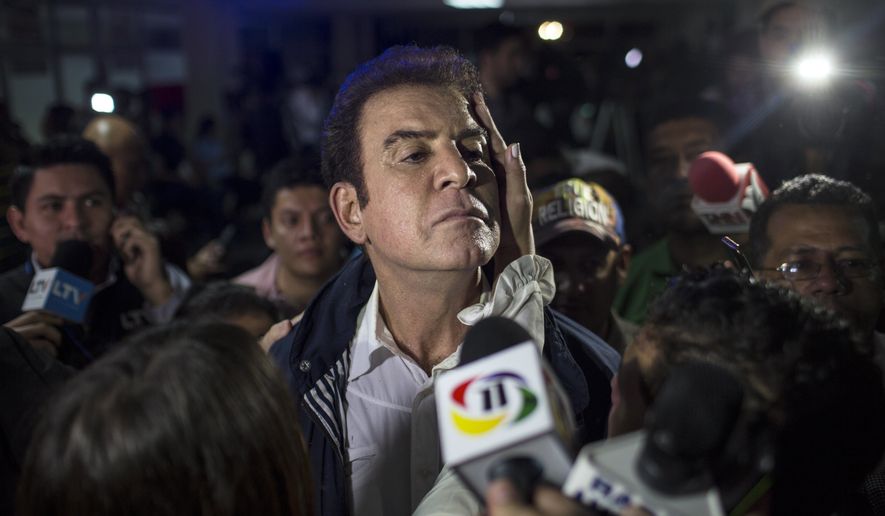An ostentatious TV show host held the lead Monday in Honduras’ presidential election — a surprise development that prompted concern among U.S. officials who’d hoped the Central American nation’s current, pro-Washington president would cruise to a second term.
Salvador Nasralla, the TV presenter turned political candidate, held a 5 percentage point lead over incumbent Juan Orlando Hernandez with 57 percent of votes counted, according to local reports.
News agencies said a Nasralla victory would be a blow for the United States, which has relied during recent years on Mr. Hernandez as an ally in tackling drug trafficking, gang violence and migration issues in Honduras.
Mr. Nasralla reportedly has the backing of former Honduran President Manuel Zelaya, leftist who was ousted in a 2009 military coup that U.S. officials were widely accused of helping to engineer.
The Trump administration may soon face the challenge of building a fresh slate of relations with Mr. Nasralla, should the TV presenter and former sports reporter pull off a surprise victory in current election that was held Sunday.
Washington has longstanding military ties to Honduras and few ideological allies among the current crop of Central American presidents, according to Reuters.
On Monday, the news agency cited an anonymous U.S. official as predicting a Nasralla victory in Honduras, but saying the vote counting could be expected to “drag on for weeks.”
The official called the situation “a real stress test for Honduras’ democratic institutions and the leadership and character of its political figures.”
While thousands of votes have yet to be counted in the nation’s rural areas, there were competing claims of victory Monday. Mr. Nasralla wrote on Twitter that he is “the new president-elect,” while Mr. Hernandez said he was the winner, according to Reuters.
Some U.S.-based analysts were critical of the Hernandez administration and the security-focused U.S. policy toward Honduras ahead of Sunday’s vote.
Alex Main, a senior associate at the Center for Economic and Policy Research in Washington, scrutinized the effectiveness of U.S. “tens of millions of dollars of security and development aid” sent to Honduras in recent years.
“On the surface, the investment seems to be paying off,” Mr. Main wrote in an analysis posted on the center’s website. “But beneath this veneer of hopeful progress and unsubstantiated claims lies a deepening nightmare.”
He questioned recent Hernandez administration claims to have brought Honduras’ homicide rate — the highest in the world only three years ago — down down to pre-2009 coup levels.
“Whatever the homicide rate may be — and many consider the government’s numbers to be dubious — Honduras remains among the most dangerous countries for those who dare challenge power,” Mr. Main wrote. “In the years since the coup, hundreds of activists have been murdered and police and judicial authorities have largely failed to take action. In fact, in many cases it appears that authorities have been complicit in the killings.”
• Guy Taylor can be reached at gtaylor@washingtontimes.com.




Please read our comment policy before commenting.